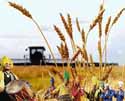Baisakhi is a harvest festival that coincides with the harvest season in India. It is a major festival of the people of Punjab, though it is celebrated throughout India by various names. The Khalsa Panth of the Sikhs was also founded on this day many centuries back.
The name Baisakhi is derived from the word 'Vaisakh' which is the month that falls in mid April. The celebration of Baisakhi consists of the Bhangra dance being done by the Punjabi men and the women to the accompaniment of traditional music. People drape them in traditional wear and gather near the river banks for the merriment.People visit Gurdwaras and distribute prasads among themselves. The Granth Sahib is read in the Gurdwaras and people throng Gurdwaras on this day. They also offer kar sewa or labor in the Gurdwaras which is the traditional custom of the Sikhs. The Granth Sahib would be taken out in a procession.
Baisakhi has a special meaning for the Sikhs. On this day in 1699, their tenth Guru, Gobind Singh, organized the order of the Khalsa. He discontinued the tradition of Gurus in Sikhism by declaring the Granth Sahib to be the eternal Guru of all Sikhs. To form the Khalsa Panth he asked his followers to volunteer to be ready to lay down their lives to save others. On this day also, Guru Arjan Dev was martyred by the Muslim rulers who, in barbaric cruelty, threw him alive into a cauldron of boiling oil.
Again, on this day in 1875, Swami Dayanand Saraswati founded the Arya Samaj-a reformed sect of Hindus who are devoted to the Vedas for spiritual guidance and have discarded idol worship.
This day is of immense religious import to the Buddhists because Gautam Buddha attained enlightenment or Nirvana under the Mahabodhi tree in the town of Gaya on this auspicious day. The day is also known, as Buddha Purnima is some parts of the country.
REGIONAL CELEBRATIONS
 In Himachal Preadesh Baisakhi is celebrated twice a year in the months of Vaishakha (April-May) and Kartika (November). People celebrate Baisakhi by worshipping Goddess Jwalamukhi and paying tribute to the deity's idol. Baisakhi day is observed as the Naba Barsha (New Year) in Bengal. On April 14, the people take a ritual bath in the River Ganga or any other river or a nearby tank and decorate their houses with rangoli or floral patterns drawn at the entrance of their homes with a paste made of rice powder.
In Himachal Preadesh Baisakhi is celebrated twice a year in the months of Vaishakha (April-May) and Kartika (November). People celebrate Baisakhi by worshipping Goddess Jwalamukhi and paying tribute to the deity's idol. Baisakhi day is observed as the Naba Barsha (New Year) in Bengal. On April 14, the people take a ritual bath in the River Ganga or any other river or a nearby tank and decorate their houses with rangoli or floral patterns drawn at the entrance of their homes with a paste made of rice powder.In Assam, this is the day for the Rongali Bihu, which is a chance for the young people of the state to dress up in their traditional finery and dance all through the night. Here also the farmers rest after the harvesting season is over.
In the South, Baisakhi is celebrated to mark the Tamil and Telugu New Year. In a ceremonial march, people take out wooden chariots in a procession. The temples in Kerala celebrate Pooram festivals usually in honor of Vishnu at this time. Among them, the Pooram observed in the Vaddakunathan Swamy (Shiva) temple of Trichur is famous.
The state of Bihar state celebrates a festival in Vaishakha (April) and Kartika (November) in honor of the Sun God, Surya, at a place called Surajpur-Baragaon.
- Click here for Baisakhi Recipes
- More on Summer festivals of India


